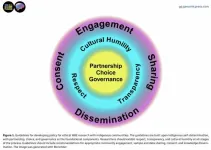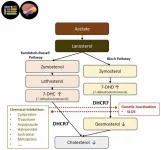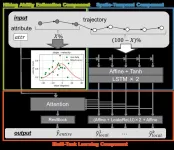(Press-News.org) GUELPH, Ontario, Canada, 25 February 2025 – In a comprehensive peer-reviewed Perspective (review) article, researchers from the University of Guelph have outlined an urgent call for new ethical frameworks to protect Indigenous communities' genetic privacy in the growing field of wastewater surveillance. The study, published today in Genomic Psychiatry (Genomic Press New York), examines how the analysis of community wastewater – while valuable for public health monitoring – raises significant privacy concerns for Indigenous populations.
"Wastewater-based epidemiology has revolutionized how we track disease patterns and community health indicators," explains Dr. Melissa Perreault, co-lead author from the Department of Biomedical Sciences at the University of Guelph. "However, the technology's ability to capture detailed genetic information creates unique risks for Indigenous communities, who have historically faced exploitation in genetic research."
The research highlights how wastewater samples can reveal sensitive information about community health, including genetic predispositions, disease prevalence, and medication use patterns. For Indigenous communities occupying distinct geographical areas, this detailed biological data collection presents particular privacy challenges.
Professor Lawrence Goodridge, who also led the study, emphasizes that DNA can persist in wastewater samples indefinitely when properly stored. "What many don't realize is that genetic material in purified wastewater extracts stored at -80°C shows minimal degradation even after two years. This long-term stability of genetic information raises important questions about data sovereignty."
The paper draws critical parallels between current wastewater surveillance challenges and historical cases where Indigenous genetic information was misused. These examples include unauthorized genetic ancestry research on the Nuu-chah-nulth First Nations' blood samples and the controversial Havasupai diabetes study that led to unauthorized mental health research.
Key recommendations from the study include:
• Development of specialized ethical guidelines for wastewater surveillance in Indigenous communities
• Implementation of robust consent processes that respect Indigenous governance structures
• Creation of clear protocols for sample storage, sharing, and destruction
• Establishment of Indigenous data sovereignty frameworks
• Integration of traditional ecological knowledge into surveillance practices
The researchers emphasize that these frameworks must balance public health benefits with stringent privacy protections through authentic community engagement. "Indigenous communities must have full control over how their wastewater data is collected, used, and shared," Professor Perreault states.
The publication coincides with growing global interest in wastewater-based epidemiology, particularly following its successful use during the COVID-19 pandemic. The researchers argue that establishing ethical guidelines now is crucial as the technology's applications continue to expand.
The full peer-reviewed Perspective (review) article, titled "Indigenous data protection in wastewater surveillance: balancing public health monitoring with privacy rights," is available on 25 February 2025 in Genomic Psychiatry, offering readers a comprehensive examination of how wastewater-based epidemiology raises critical privacy and ethical concerns for Indigenous communities while suggesting frameworks for responsible implementation. The article is freely available online at https://doi.org/10.61373/gp025p.0008.
About Genomic Psychiatry – Genomic Psychiatry: Advancing Science from Genes to Society (ISSN: 2997-2388) represents a paradigm shift in genetics journals by interweaving advances in genomics and genetics with progress in all other areas of contemporary psychiatry. Genomic Psychiatry publishes peer-reviewed medical research articles of the highest quality from any area within the continuum that goes from genes and molecules to neuroscience, clinical psychiatry, and public health.
END
New study calls for ethical framework to protect Indigenous genetic privacy in wastewater monitoring
Researchers outline critical safeguards needed to balance public health benefits with Indigenous data sovereignty rights
2025-02-25
ELSE PRESS RELEASES FROM THIS DATE:
Common medications may affect brain development through unexpected cholesterol disruption
2025-02-25
OMAHA, Nebraska, USA, 25 February 2025 - In a peer-reviewed Perspective (review) article, researchers at the University of Nebraska Medical Center have uncovered concerning evidence that commonly prescribed medications may interfere with crucial brain development processes by disrupting sterol biosynthesis. Their findings, published today in Brain Medicine (Genomic Press, New York), suggest that this previously overlooked mechanism could have significant implications for medication safety during pregnancy and early development.
"What we've discovered is that many prescription medications, while designed for entirely different purposes, can inadvertently interfere with the brain's ...
Laser-powered device tested on Earth could help us detect microbial fossils on Mars
2025-02-25
The first life on Earth formed four billion years ago, as microbes living in pools and seas: what if the same thing happened on Mars? If it did, how would we prove it? Scientists hoping to identify fossil evidence of ancient Martian microbial life have now found a way to test their hypothesis, proving they can detect the fossils of microbes in gypsum samples that are a close analogy to sulfate rocks on Mars.
“Our findings provide a methodological framework for detecting biosignatures in Martian sulfate minerals, potentially guiding ...
Non-destructive image sensor goes beyond bulkiness
2025-02-25
While photo-thermoelectric (PTE) sensors are potentially suitable for testing applications, such as non-destructive material-identification in ultrabroad millimeter-wave (MMW)–infrared (IR) bands, their device designs have primarily employed a single material as the channel. In general, PTE sensors combine photo-induced heating with associated thermoelectric (TE) conversion, and the employment of a single material channel regulates the utilization of devices by missing the opportunity for fully utilizing their fundamental parameters. ...
1st Japanese version of US psychological scale for esophageal symptoms
2025-02-25
Psychological factors have a greater impact on the severity of symptoms in esophageal diseases than objective evaluations, such as acid reflux and esophageal motility function. Although there are questionnaires that assess general psychological states in Japan, there were none that were specific to esophageal symptoms. In the United States, meanwhile, the Esophageal Hypervigilance and Anxiety Scale (EHAS) questionnaire that evaluates symptom-specific hypervigilance and anxiety for esophageal symptoms was developed in 2018.
In an effort to expand the use of EHAS, Dr. Akinari Sawada’s research group at Osaka Metropolitan ...
HikingTTE: a deep learning approach for hiking travel time estimation based on personal walking ability
2025-02-25
At the University of Electro-Communications, a research team led by Mizuho Asako, Yasuyuki Tahara, Akihiko Ohsuga, and Yuichi Sei has developed a new deep learning model called "HikingTTE" that significantly improves hiking travel time estimation. Hiking is popular worldwide, but accidents still occur when hikers underestimate the time needed to reach their destination.
This model could help reduce mountain accidents and improve hiker safety by providing more accurate travel time predictions. Previous hiking travel time estimation methods often use the relationship between slope (uphill or downhill) and walking speed. However, these ...
Environment nudges birds to fast, or slow, life lane
2025-02-25
Birds worldwide make strategic decisions about how they live based on their environmental conditions. Some live fast, die young, and leave as many chicks as possible. Others live long and prosper by not breeding.
A new study of non-migratory birds provides clues about how climate change may affect the long-standing evolutionary strategies of feathered friends. The work is reported in this week’s Ecology Letters and was led by Michigan State University postdoctoral fellows of the MSU Institute for Biodiversity, Ecology, Evolution, and Macrosystems (IBEEM).
The ...
The U-shaped relationship between admission peripheral oxygen saturation and all-cause hospital mortality in acute exacerbation of chronic obstructive pulmonary disease: a retrospective analysis using
2025-02-25
Highlight box
Key findings
• This study investigated the U-shaped nonlinear relationship between admission oxygen saturation (SpO2) and all-cause hospital mortality in patients with acute exacerbation of chronic obstructive pulmonary disease (AECOPD). The results showed that the lowest all-cause hospital mortality was observed at an SpO2 of 89.5%. Additionally, SpO2 was identified as an independent risk factor for predicting all-cause hospital mortality in AECOPD patients, providing valuable guidance for optimizing oxygen therapy in this population.
What is known and what is new?
• Most studies indicate that maintaining SpO2 levels between 88–92% provides ...
New research highlights wide variation in prostate cancer testing between GP practices
2025-02-25
A largescale study has found huge variation between GP practices on whether they are likely to pick up prostate cancer using a blood test.
The University of Exeter led a study which aimed to investigate the proportion of patients whose prostate cancer was identified by using a prostate-specific antigen (PSA) test when patients had no symptoms.
The research published in the British Journal of General Practice and funded by Cancer Research UK, and, has found that one in five patients with prostate cancer in England are diagnosed after PSA testing when they had no symptoms – fewer than previously thought. The PSA test ...
Antidepressants linked to faster cognitive decline in dementia
2025-02-25
New research suggests that antidepressants can accelerate cognitive decline in people with dementia. At the same time, some drugs appear to be less harmful than others, which can help doctors make better treatment decisions, according to the study published in BMC Medicine.
Antidepressants are often used to relieve symptoms such as anxiety, depression, aggressiveness, and sleep disturbances in dementia sufferers.
However, a new observational study based on data from the Swedish Dementia Registry (SveDem) shows that patients with dementia who are treated with antidepressants experience an increased cognitive decline compared to patients who do not ...
DNA origami suggests route to reusable, multifunctional biosensors
2025-02-25
Using an approach called DNA origami, scientists at Caltech have developed a technique that could lead to cheaper, reusable biomarker sensors for quickly detecting proteins in bodily fluids, eliminating the need to send samples out to lab centers for testing.
"Our work provides a proof-of-concept showing a path to a single-step method that could be used to identify and measure nucleic acids and proteins," says Paul Rothemund (BS '94), a visiting associate at Caltech in computing and mathematical sciences, and computation and neural systems.
A paper describing the work recently appeared in the journal Proceedings of the National Academy of Sciences. The lead authors of ...
LAST 30 PRESS RELEASES:
COVID-19 vaccination during pregnancy may help prevent preeclampsia
Menopausal hormone therapy not linked to increased risk of death
Chronic shortage of family doctors in England, reveals BMJ analysis
Booster jabs reduce the risks of COVID-19 deaths, study finds
Screening increases survival rate for stage IV breast cancer by 60%
ACC announces inaugural fellow for the Thad and Gerry Waites Rural Cardiovascular Research Fellowship
University of Oklahoma researchers develop durable hybrid materials for faster radiation detection
Medicaid disenrollment spikes at age 19, study finds
Turning agricultural waste into advanced materials: Review highlights how torrefaction could power a sustainable carbon future
New study warns emerging pollutants in livestock and aquaculture waste may threaten ecosystems and public health
Integrated rice–aquatic farming systems may hold the key to smarter nitrogen use and lower agricultural emissions
Hope for global banana farming in genetic discovery
Mirror image pheromones help beetles swipe right
Prenatal lead exposure related to worse cognitive function in adults
Research alert: Understanding substance use across the full spectrum of sexual identity
Pekingese, Shih Tzu and Staffordshire Bull Terrier among twelve dog breeds at risk of serious breathing condition
Selected dog breeds with most breathing trouble identified in new study
Interplay of class and gender may influence social judgments differently between cultures
Pollen counts can be predicted by machine learning models using meteorological data with more than 80% accuracy even a week ahead, for both grass and birch tree pollen, which could be key in effective
Rewriting our understanding of early hominin dispersal to Eurasia
Rising simultaneous wildfire risk compromises international firefighting efforts
Honey bee "dance floors" can be accurately located with a new method, mapping where in the hive forager bees perform waggle dances to signal the location of pollen and nectar for their nestmates
Exercise and nutritional drinks can reduce the need for care in dementia
Michelson Medical Research Foundation awards $750,000 to rising immunology leaders
SfN announces Early Career Policy Ambassadors Class of 2026
Spiritual practices strongly associated with reduced risk for hazardous alcohol and drug use
Novel vaccine protects against C. diff disease and recurrence
An “electrical” circadian clock balances growth between shoots and roots
Largest study of rare skin cancer in Mexican patients shows its more complex than previously thought
Colonists dredged away Sydney’s natural oyster reefs. Now science knows how best to restore them.
[Press-News.org] New study calls for ethical framework to protect Indigenous genetic privacy in wastewater monitoringResearchers outline critical safeguards needed to balance public health benefits with Indigenous data sovereignty rights








